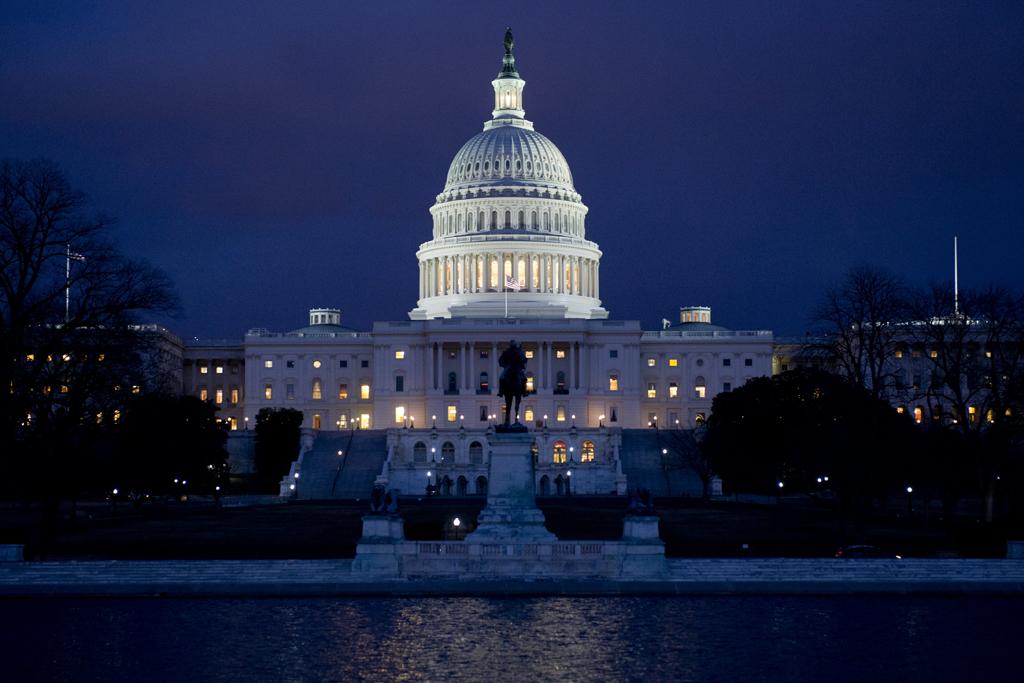See castration: Bills go unpaid — America gets spayed
The US Capitol in Washington, DC, is seen on Feb. 28, 2013. US President Barack Obama summoned congressional leaders Friday in a bid to avert budget sequestration, but Obama was bound by law to initiate the automatic spending cuts on March 1, 2013.
CAMBRIDGE, Mass. — Sequestration is a mouthful of Washington gobbledygook. Unfortunately, it is even worse than it sounds. The operation that will take place today was invented by budget wonks working for Congress and the president. Their goal was to create a nightmare so blatantly irresponsible and indefensible that politicians would be forced to act sensibly to escape.
Recalling Samuel Johnson's observation about the impact of the prospect of being hanged in the morning, this would “wonderfully concentrate the mind.”
Unfortunately, it did not. Until the past month, Deputy Defense Secretary Ash Carter (who manages the Department of Defense’s $620 billion budget) had publically refused to plan for sequestration, arguing that he would not "participate in assisted suicide.”
Today, he will be forced to don the garb of DOD’s first “Dr. Kevorkian.”
In reality, just how bad can a cut of $47 billion from a budget of $620 billion be? If the defense secretary were given discretion to eliminate programs and projects that contribute little to the nation’s defense, this could be done readily enough. Eliminating waste could even strengthen our military capabilities.
Instead, sequestration requires across-the-board cuts in every DOD program (all 2,500 of them) by 9 percent. While these slices would not be as devastating as some claim, they would be just as dumb. Mandatory defense reductions will include:
• Telling 800,000 civilian employees to not to show up to work one day a week
• Keeping the aircraft carrier USS Harry S. Truman in port rather than sending it to the Persian Gulf
• Reducing the number of counter-intelligence people on the job
• Retiring 500 pilots by the end of the 2013 fiscal year and 100,000 soldiers by the end of fiscal year 2014
• Ending most new ship building and construction projects (as Leon Panetta said, “You cannot buy three quarters of a ship”)
Thus today, the government of the greatest nation on the earth will submit to something that would have better been labeled “castration.” While normally performed on bulls, not budgets, the near-rhyme of the two words and perversity of both actions invite the comparison.
If the failure to reach compromise to avoid this stupidity is symptomatic (a reasonable assumption, given the country’s near-dive over the fiscal cliff on Jan. 1), the nation has even more to fear in the next four weeks.
By March 27, the same Congress that could not find a way to escape sequestration will have to pass a Continuing Resolution or force the United States' government to shut down (as it did for a week in 1996). Shortly thereafter, we will see the battle of competing budgets for the new year: one proposed by the President, a second from the Republican-led House, and a third from the Democrat-led Senate.
And March Madness will roll into the battle royal in late spring and early summer when Washington must again raise the debt ceiling or default.
Imagine that the US faced an evil enemy who had a devious strategy for weakening America. He would be hard-pressed to improve on this script. Little wonder that recent polls find members of Congress less popular than cockroaches and colonoscopies (though on the bright side, 53 percent of Americans thought they were better than gonorrhea).
In a dangerous world, the US remains the "indispensable nation."
If the objective were to emasculate our new secretary of state on his first foreign tour, today’s action would be a smart move. Strong countries can, of course, survive stupid mistakes. Fortunately, budgetary sequestration is more like cutting off a slice of your nose to spite your face, rather than actual castration that would jeopardize future generations.
But participants in this continuous, high-visibility soap opera should ponder its impact on Americans’ confidence in our democracy at home and America's ability to project power abroad.
Graham Allison is the director of the Belfer Center for Science and International Affairs at Harvard's John F. Kennedy School of Government. Allison is also a former assistant secretary of defense.
Every day, reporters and producers at The World are hard at work bringing you human-centered news from across the globe. But we can’t do it without you. We need your support to ensure we can continue this work for another year.
Make a gift today, and you’ll help us unlock a matching gift of $67,000!
